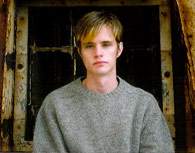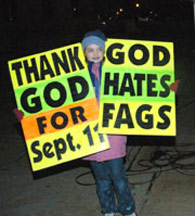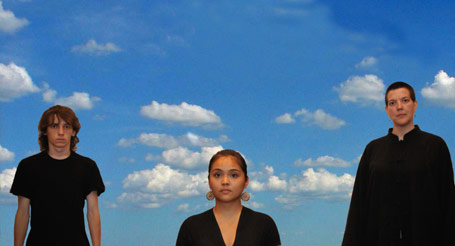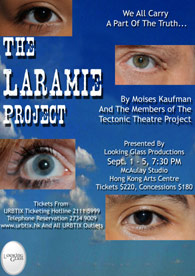On the night of 6-7 October 1998, Matthew Shepard, a gay 21-year-old first year politics student at the University of Wyoming, was taken from a bar by two local men who had set out that night to rob a gay man, tied to a fence off a remote country lane, pistol whipped, tortured and left to die. He had not died when he was found some eighteen hours later, but did so after a long battle to survive that ended only on 12 October. The injuries to his head included a fracture that ran from the back to the front of his skull and brain stem damage that prevented surgery.

Matthew Shepard, a gay 21-year old-student in Laramie, Wyoming was tied to a fence off a remote country lane, tortured and left to die.
During the subsequent trial, the defence unsuccessfully attempted to blame Shepard for sexually propositioning his assailants, invoking what was known in the United States as ‘the gay panic defence’, which supposedly excuses violence due to temporary insanity. Both of his assailants were aged about the same age as Matthew. One of them, Russell Henderson, pleaded guilty and incriminated the other, Aaron McKinney. Both were found guilty of felony murder and kidnapping and both got two consecutive life sentences, McKinney (only due to the intervention of the Shepard family, who pleaded for clemency when he had been facing the death penalty) without the possibility of parole.
Though comments made after the trial added possible dimensions of drugs and sex (both assailants, for instance, were alleged to have been using drugs and McKinney was alleged - though he denied it - to be bisexual) this appalling crime was taken at the time, and has since remained so considered, as a hate crime committed against a gay man because of his sexual orientation.
At the time, there was no federal or state law that included as hate crimes attacks on victims due to their orientation, and Matthew’s death led directly to initiation of federal legislation to remedy this. Attempts began in 1999 to persuade Congress to pass what became known as ‘The Matthew Shepard Act’ (in full, the Local Law Enforcement Hate Crimes Prevention Act) and these attempts continue to the present day, the current version of the bill being amended in the Senate only this month. It is hoped that the Democrat-controlled Congress and President Barack Obama will finally ensure the measure passes into law soon.

The crime gave rise to several other lasting effects. One bad one was the rise to national, then international, notice of the homophobic Westboro Baptist Church of Topeka, Kansas, whose founder Fred Phelps led a party to picket both Matthew’s funeral and the court case. Phelps and his fellows carried placards saying ‘Matthew Shepard rots in hell’, ‘AIDS kills fags dead’, and ‘God hates fags’. This group gained notoriety in Laramie and then all over the country, later picketing funerals of US servicemen killed in action in Iraq and Afghanistan, alleging that their deaths were due to the tolerance of homosexuality in the USA.
A positive effect of the murder in 1998 was the foundation by Matthew’s parents of an NGO named after him, the Matthew Shepard Foundation (see www.matthewshepard.org), which is dedicated to support diversity and tolerance in youth groups. Matthew’s mother Judy became the Foundation’s leading figure and a nationally recognised LGBT activist.
The arts were not slow to focus on the story. Commencing in November 1998, Moisés Kaufman and ten other writers of the Tectonic Theater Project interviewed a very large number of Laramie’s townspeople and created a play, The Laramie Project, using only the verifiable material from their hundreds of interviews, their own journal entries for the period and published sources. The play, consisting of three acts with eight actors taking over sixty of the roles of those involved, premiered in Denver in 2000 and has been shown widely ever since, often accompanied by picketing from Fred Phelps’s group.
HBO turned the play into a TV film using the same writers and material in 2002, and starring, among many, Peter Fonda and Laura Linney. The film won five awards and seven nominations internationally, including a special mention at 2002’s Berlin International Film Festival. The film and play have been used in education programmes aimed at countering homophobia worldwide, in England, for instance, being included in a GCSE syllabus. US TV also made another film of the story in 2002, The Matthew Shepard Story, directed by Roger Spottiswoode, and two more productions, Anatomy of a Hate Crime and Laramie Inside Out have followed since. Elton John (“American Triangle”), Tori Amos ("Merman") and Melissa Etheridge ("Scarecrow") have composed songs about the case.
The story has been brought to Asia. It was to have been featured in Shanghai’s first Pride Festival (though was one of the items banned eventually by the authorities) but eventually got a showing at the River South Art Center there on 19 and 20 June this year.
Now, it is to be shown in Hong Kong, by the local theatre group, Looking Glass Productions. I talked at the Fringe Club to its Artistic Director and Founder, Eric Ng, about his company and the play.
Eric was born in New York of Chinese parents who had emigrated to the States in the ‘70s and lived his early life in the second largest Chinatown in New York in Flushing, Queens. He studied at high school and college there and turned early to the stage, initially on the technical side but later as an actor and director.
Back in Hong Kong, and working in marketing in a US corporation, he dreamed of getting back into the world of theatre. The result was his founding in 2007, with friends Teri Fitsell (Producer) and Paul Sheehan (Creative Adviser), of Looking Glass, a production company aiming to bring the kind of ‘edgy’ English theatre to Hong Kong that they felt the place so far lacked. They kicked off at the Fringe Club in March 2008 with the black comedy Pillowman, this a play by acclaimed Irish playwright Martin McDonagh, about a writer of gorily-realistic children’s books who finds himself accused of murders based on the stories he has written; a play that interested Eric, as he told me, as it focusses on issues which resonate with him personally, the balance between ‘work, family and the theatre’, the protagonist plumping for the responsibilities of the latter over the other two (as, indicates, Eric, would he do himself).
This opening play was a great success and Eric quickly followed it in December 2008 with American Michael Golamco’s play of 2005, Cowboy vs Samurai, an adaptation of Cyrano de Bergerac in which that Frenchman’s nose is replaced by the smooth skin of an Asian American spurned by a lover of Caucasians. Then, only two months later in February 2009, this time directed by Eric for the Hong Kong Players, came another play by Martin McDonagh, The Lieutenant of Inishmore. This play, ‘very dark, very bloody and very funny’, established Eric’s reputation for the cutting edge, the violent and the disturbing, a reputation he is now adding to this September with The Laramie Project. It will not be the last time Eric and Looking Glass go out to shock and provoke Hong Kong’s audiences.
“This isn’t about making money,” Eric adds (needlessly, alas, in Hong Kong, where a career in theatre is one that can never pay and where Government assistance in the provision of smaller venues, and even translations for sub-titles which might draw largely Chinese speaking audiences, is lacking).
“It’s about wanting to show people concepts, producing good shows, expanding the envelope.” Despite having to carry on making a living (and he is now studying for a masters degree in electronic commerce to do just that), he intends to go on building on what he has achieved on the stage so far.
Eric does not view The Laramie Project as a play about homosexuality.
“It’s a play about tolerance and about the effect of a hate crime on the individuals of a small town which is anthropomorphised by CNN and Fox into a single entity in the eyes of the world,” Eric adds.
“It has a message against hate, that’s why we want to do this play now.”
It is indeed a play for its times. Hong Kong is lucky in that it has so far been free of any recorded instances of the kinds of violent hate crime against sexual minorities that ended Matthew Shepard’s life. But it is not lucky enough to have avoided many of the manifestations of hate spawned by the fundamentalist religious right that lie behind the psychologies that produce such crimes. All too often in Hong Kong we hear cries of sin, moral corruption and menace to public health, all aimed at denigrating gays and lesbians.
In uneducated, clouded or disturbed minds it is these cries which give ‘justification’ for acts of prejudice. If Matthew Shepard’s death can be said to mean anything, it is as a clear lesson of where hate leads. The acknowledgement of that lesson, and the tolerance to which that must lead, are that poor young man’s gifts to us. It is tragic that so much pain and sorrow is needed to change people’s minds. The Laramie Project shows, at root, ‘good coming out of evil’ and will, Eric hopes, change people’s minds in a better way.
The Laramie Project stages at the McAulay Studio Theatre in the Hong Kong Arts Centre 1-5 September at 7.30 pm. Tickets are HK$220 for adults, HK$180 for students and seniors, and are now on sale through URBTIX.


